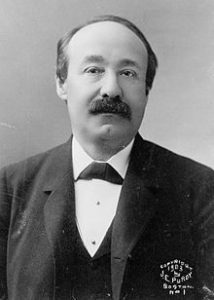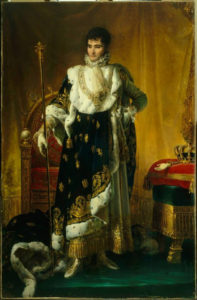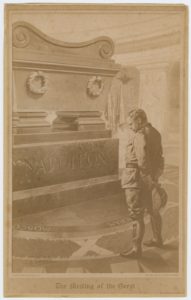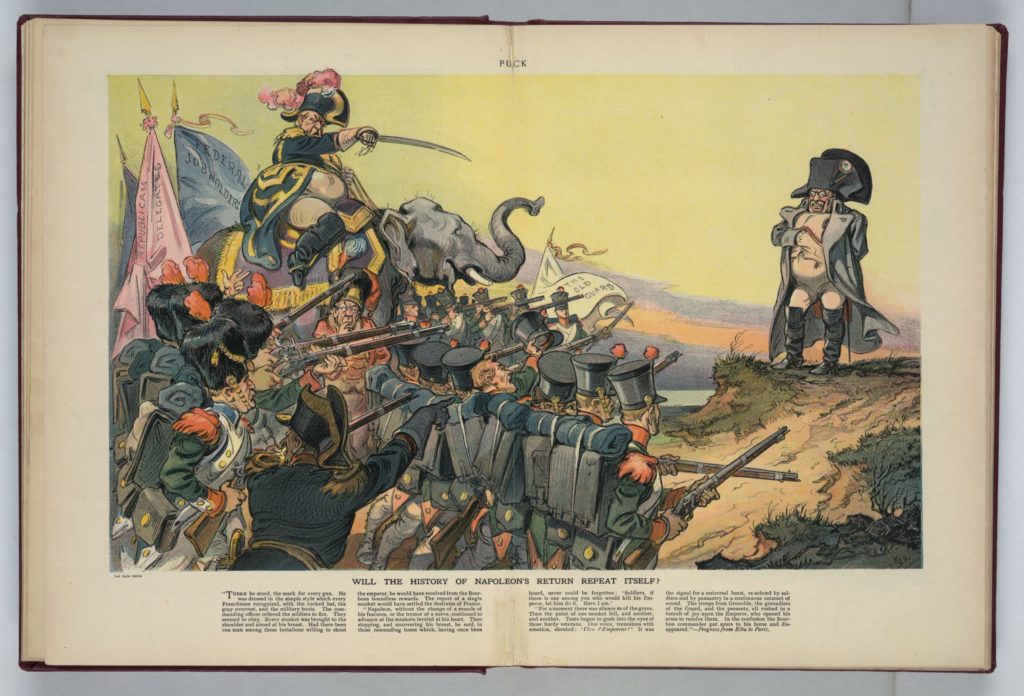
Okay, not the Emperor Napoleon Bonaparte, but how about his American great-nephew?
In 1908, U.S. Attorney General Charles Joseph Bonaparte (1851 – 1921), founded the first corps of federal government investigators. Those thirty-four Special Agents became the Bureau of Investigation, later called the Federal Bureau of Investigation. With the FBI dominating today’s headlines, I thought I’d do my own investigation into how a Bonaparte became its founder.
It goes back to Napoleon Bonaparte’s youngest brother Jérôme. All seven of Napoleon’s siblings expected their wildly successful brother to shower them with power and wealth. Jérôme, who could barely remember a time when Napoleon was a Corsican nobody, raced up the French Navy’s ranks.
 At nineteen, he was the inexperienced captain of a patrol ship in the Caribbean. After he made some poor decisions, his commanding officers sent him to France to report in to Napoleon.
At nineteen, he was the inexperienced captain of a patrol ship in the Caribbean. After he made some poor decisions, his commanding officers sent him to France to report in to Napoleon.
The headstrong young man took a detour to the United States. There he met, married and impregnated a Baltimore heiress, Elizabeth Patterson. If you’re interested in the details of that relationship, I recommend Carol Berkin’s excellent book, WONDEROUS BEAUTY, the Life and Adventures of Elizabeth Patterson Bonaparte.
 Here’s the short version: Napoleon, who indeed showered wealth on his siblings, expected obedience in return. Like all royalty of the era, they were to marry for political advantage. Forewarned of his brother’s arrival, Napoleon denied Elizabeth entry into France. Jérôme, lured with the crown of Westphalia, deserted her. Quickly, the pope annulled the marriage.
Here’s the short version: Napoleon, who indeed showered wealth on his siblings, expected obedience in return. Like all royalty of the era, they were to marry for political advantage. Forewarned of his brother’s arrival, Napoleon denied Elizabeth entry into France. Jérôme, lured with the crown of Westphalia, deserted her. Quickly, the pope annulled the marriage.
Pregnant Elizabeth gave birth to her son Jérôme Napoleon (“Bo”) Bonaparte in England, and returned to Baltimore with her “illegitimate” child.
In Maryland, Bo Bonaparte (1805 -1870) enjoyed a privileged life and married a railroad heiress. His younger son, Charles Joseph Bonaparte, is the hero of this post.
Charles met Theodore Roosevelt in Harvard Law School. Both were political progressives. In 1905, this Bonaparte—Emperor Napoleon’s great-nephew—joined President Roosevelt’s cabinet as Secretary of the Navy, an ironic twist considering his grandfather’s aborted naval career. In 1906, he became the forty-sixth United States Attorney General. He played a key role in Roosevelt’s efforts to break up industry monopolies that were using unfair business practices to stifle competition. After Bonaparte broke up the American Tobacco Trust, he earned the nickname “Charlie the Crook Chaser.”
In the same vein, Charles Joseph Bonaparte set up the Department of Justice’s corps of Special Agents to root out corruption in local police. Before that corps, the federal government didn’t have its own investigative resources. All policing took place on the state or local level. Emperor Napoleon might have liked the move to centralized police power. I’m less sure how he would have viewed his great-nephew’s reputation as champion of the little guy.
 Charles Bonaparte earned several mentions in Theodore Roosevelt’s AN AUTOBIOGRAPHY. They all relate to trust busting. The creation of what became today’s FBI doesn’t come up so TR must not have recognized its significance. However, he does refer to Bonaparte and his successor attorneys general as “profound lawyers and fearless and able men.”
Charles Bonaparte earned several mentions in Theodore Roosevelt’s AN AUTOBIOGRAPHY. They all relate to trust busting. The creation of what became today’s FBI doesn’t come up so TR must not have recognized its significance. However, he does refer to Bonaparte and his successor attorneys general as “profound lawyers and fearless and able men.”
In 1910, shortly after his second term in office, Teddy Roosevelt visited Napoleon’s tomb at Les Invalides in Paris. Probably, he also paid tribute to his former attorney general’s grandfather, because Jérôme Bonaparte is buried there, too.

It’s comparing Roosevelt’s effort to become a three-term president to Emperor Napoleon’s disastrous return to power after his first exile. A blustering Teddy Roosevelt stands accused of Napoleonic overreach.
Emperor Napoleon’s great-nephew Charles Joseph Bonaparte achieved more reasonable ambitions. As a trust-buster and founder of the FBI, this forgotten Bonaparte contributed to the American story.

Wow! Who would have guessed Napoleon Bonaparte’s distant, unintended, and circuitous influence on the foundation of the FBI?
Hi, Rex! Yes, my friend J. David Markham, who (among other honors) heads the International Napoleonic Society, always says, “Napoleon’s everywhere.” That may be over the top, but I almost always find a Napoleonic connection wherever I go.
Margaret
Is Robert Bonaparte, attorney at law, in Portland, Oregon descended from Charles Bonaparte? I would imagine he is.
Hi, Trudy Bishop! I don’t know if he is or not. I bet he’d be happy to tell you.
Thanks for visiting my site. Are you interested in the Bonaparte family?
Margaret